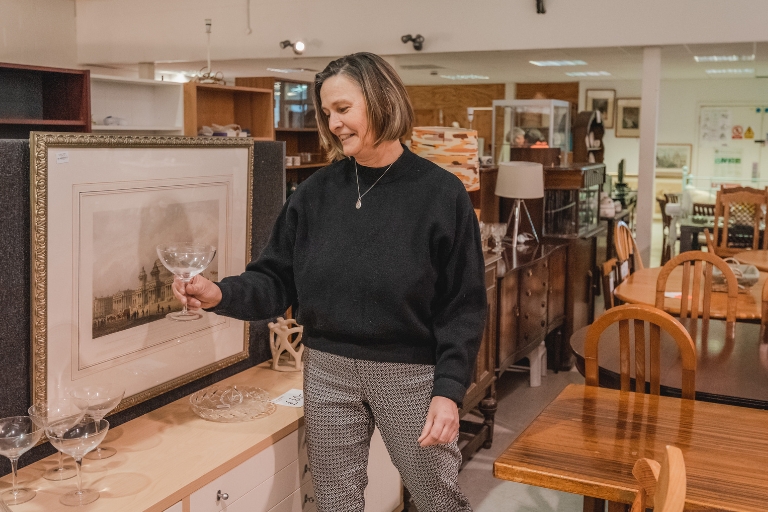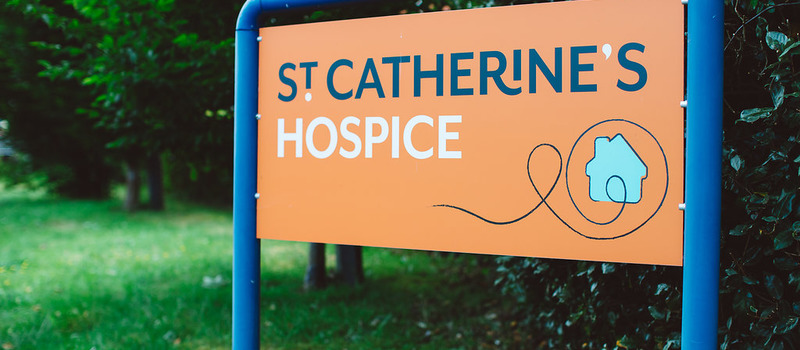None of us underestimate the power of a hug, a cup-of-tea or an honest conversation.
Bev Duncanson is a Senior Staff Nurse working on the wards at St Catherine’s. Here she tells us about her role, its challenges, and why it’s ok to have a bad day.
Tell us about your role:
I joined St Catherine’s in 2016 as a Return to Practice student. I had been interested in palliative care but had never worked in this specialty and I enjoyed my experience on the In-Patient Unit so much that I applied for a job!
I worked briefly as a Healthcare Assistant before starting my role as Staff Nurse on the wards. After a couple of years, I took some time out to study full-time and achieved my bachelor’s degree. Since returning, I have worked in the community with the Hospice at Home team, and I currently work as a Senior Staff Nurse on the In Patient Unit.
My role is ward-based, providing day-to-day care for our patients and their families. As a ward nurse, we assess, plan, implement and evaluate individualised patient care. This could be managing symptoms, providing personal care, administering medication, changing wound dressings, or providing emotional support to patients and families, as well as liaising with the multi-disciplinary team (MDT). As the nurse-in-charge, we support the ward staff and manage the unit for that shift. This involves liaising with other clinical and non-clinical teams, dealing with queries from families or external agencies and sorting out any issues on that shift. No two days are ever the same!
What made you decide to work as a Palliative Care nurse?
When I helped to care for one of my best friends who was receiving end-of-life care at home, I realised that I was drawn to it. I felt that if I was able to cope with supporting one of my closest friends and her family at this difficult time, then I could probably manage it for others.
I made up my mind to apply for palliative care when I returned to nursing, and I haven’t looked back since!
What’s the best bit about your role?
Being alongside people when they most need it.
It is a real privilege to be so involved in someone’s life during their final weeks, days or hours; but it’s also a huge responsibility – we only have one chance to get it right for our patients and their loved ones.
The relief that is often expressed by patients and their families when they arrive at the hospice or receive much-needed support at home is humbling and it’s such a privilege to be a part of that.
Often, it’s the little things that make a difference to the lived experience of our patients: none of us underestimate the power of a hug, a cup-of-tea or an honest conversation.
What’s the hardest bit about your role?
Being alongside people when they most need it.
Sadly, we can’t make a difference to the outcome for our patients, but we can make a difference to their journey; and if we can support someone to a death that is pain-free and distress-free, whilst supporting their loved ones, then hopefully we have helped them to have a positive end-of-life experience.
It’s tough emotionally and physically but I am fortunate to work with some amazing colleagues who are all very supportive of each other. We laugh and cry together. It’s ok to have a bad day.
What about training opportunities?
I have always been encouraged to apply for training courses to develop my knowledge. I have previously been supported with an Open University module: ‘Death, Dying and Bereavement’ and I’m currently working through the Edward Jenner leadership course. I have an Advanced Communications course at Princess Alice Hospice later this month, which I’m looking forward to – I love meeting other hospice staff and hearing about the differences and similarities of other palliative care settings. If it’s a course that’s relevant and available, then you’re encouraged to go for it!
Does this job impact you outside of work?
Yes of course, but mainly in a positive way. I have a love for life and always try to maximise the opportunities that I have – whether that’s travelling, exercising, learning or being with others. Most importantly I try to spend time with my loved ones. Working in the palliative care setting makes you cherish the time you have left, and I certainly don’t take a moment for granted.
I often talk about death and dying and openly encourage my family and friends to discuss their thoughts and fears and to make a will if they don’t have one.
My reading and viewing material is often on death or dying too, as I find different lived experiences and perspectives so interesting!
And finally…
If someone is considering working at St Catherine’s, then I’d say come along and join the team! We’re a really supportive bunch! It’s tough at times but there is a lot of support in place and it really is a truly privileged job that we do.













